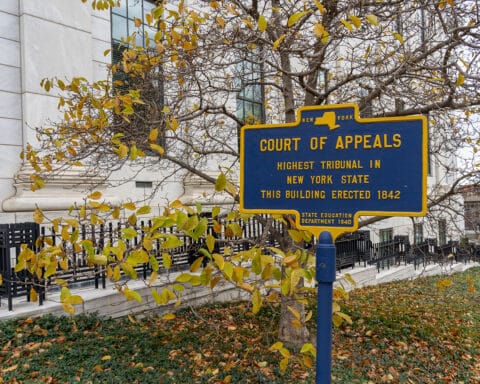This is the second of two articles on bridging the abortion issue with compassion.
If advocates for legal abortion are correct when they cite certain studies, then virtually no woman who has an abortion ever regrets it.
But the reality is quite different, according to people who have worked with post-abortive women.
“Women do suffer. They may not recognize it right away, but it definitely impacts their life,” said Maureen Ciardiello, the coordinator for Project Rachel, an abortion-healing ministry in the Diocese of Bridgeport, Connecticut.
Ciardiello told Our Sunday Visitor that is not unusual to see women suffer from “a slew of symptoms” related to having had an abortion, including depression, anxiety, promiscuity and alcohol and drug abuse.
“People are suffering, and sometimes they can’t get in touch with their feelings,” Ciardiello said. “Sometimes they shut down, or it’s been many years that they haven’t dealt with it, and it’s very hard for them to start opening up right away. For many, it’s a process.”
Narrative of the culture
However, the reality of that suffering appears at risk of being another casualty of truth in the nation’s ongoing culture wars over abortion, especially as more strident advocates of legal abortion work to encourage post-abortive women to take pride in and to “shout” their abortions.
“I am a good person, and my abortion made me happy. It’s perfectly reasonable to feel happy that you were not forced to become a mother,” Amelia Bonow, the co-founder of ShoutYourAbortion.com, wrote in an article earlier this year for Salon.
In a June 10 interview on National Public Radio’s “Living Lab Radio,” Dr. Luu D. Ireland, an assistant professor of obstetrics and gynecology at the University of Massachusetts Medical School, argued in favor of one survey that indicates women do not regret their abortions.
Because of the stigma surrounding abortion, Ireland said 58% of post-abortive women keep it a secret from their family members and friends, “and this is not out of regret — 95% of people who choose abortion feel it was the right decision and were comfortable with the decision.”
Ireland was referring to a July 2015 study published in the multidisciplinary academic journal PLOS ONE. The study, which was carried out by researchers from the Bixby Center for Global Reproductive Health at the University of California San Francisco’s School of Medicine, surveyed 670 post-abortive women over a three-year period.
In that study, researchers concluded that the “overwhelming majority” of the women who participated in the study felt that abortion had been the right decision “both in the short-term and over three years.” The researchers said they also found that the emotions the women felt after their abortions decreased over time as their self-esteem and life satisfaction grew.
Drawing from her own experience in treating women who sought abortion, Ireland, who favors keeping abortion legal, told NPR that post-abortive women “are people who make these decisions with a lot of thought, a lot of reflection.”
Need for long-term studies
However, pro-life leaders point out that studies such as the survey cited in PLOS ONE often rely on flawed methodologies, including following women’s psychological states for too short a time after their abortions.
“They often only track women for five or six years after they have had the abortion, which is before many of them have fully processed the event or connected many mental health issues they’re experiencing to their abortion,” said Kat Talalas, the assistant director for pro-life communications in the U.S. Conference of Catholic Bishops’ Secretariat of Pro-Life Activities.
Randall K. O’Bannon, the director of education and research at the National Right to Life Educational Trust Fund, analyzed the survey in PLOS ONE and told OSV that its sample consisted of a group of people who were already predisposed to favoring legal abortion.
“This was not a random sample of women,” said O’Bannon, who added that asking women within too short a period of time after their abortions will yield skewed results about their post-abortive feelings.
According to Project Rachel, the Catholic Church’s diocesan program for post-abortive healing in the United States, women often report relief immediately after an abortion. But the research indicates that relief fades over time. Overwhelming anecdotal evidence from post-abortion counseling programs reveals that many women seek help five to 12 years after their abortion.
“Some people have emailed me within a day of having an abortion. Sometimes it could be 50 years for someone as they’re coming to their end years and they begin contemplating things,” said Ciardiello, of Project Rachel in the Bridgeport diocese.
Talalas told OSV that finding conclusive data on post-abortion regret is often difficult because there are not many substantial studies that survey post-abortive women 10 or 20 years after their abortions. She added there are often problems with the surveys’ sample sizes and selection of participants.
“We do know from a meta-analysis of 22 studies that women who have undergone an abortion experience an 81% increase of mental health problems, 10% of that which is directly attributable to the abortion itself,” Talalas said.
Talalas was referring to a 2011 meta-analysis of 22 abortion-related studies that questioned more than 877,000 women between 1995 and 2009. The meta-analysis also found that post-abortive women had a 138% higher risk of mental health problems compared to those who have given birth, and higher rates of anxiety, depression, drug use and suicidal behaviors.
“There’s plenty of evidence that women do have some regret about their abortions, and do seek healing,” said Talalas, who added that the website hopeafterabortion.com, which connects women to Project Rachel, receives about 90,000 unique visitors a month.
“Project Rachel is also in two-thirds of the dioceses, and it’s expanding,” Talalas said. “Parishes are continually asking for more resources for this, so we know that this is a growing ministry that’s being sought by more and more women.”
Talalas said there is a need for better research on post-abortive women and their needs.
“We should have longitudinal studies on the impact of abortion that examine women for much longer period of time,” Talalas said. “That would help people, I think, to honestly better understand the impact of abortion.”
Suffering is real
Sister of Mercy Marysia Weber, a facilitator for Project Rachel in the Archdiocese of St. Louis, told OSV that, while some women come forward for help with healing within months after an abortion, most do not contact Project Rachel until 25 or 30 years have passed. She recalled speaking with an 82-year-old woman in a hospital who was at the end of her life and wanted to confess her abortion from many years earlier.
“She was aching to be forgiven before she met the Lord,” said Sister Marysia, who is also the director of the Office of Consecrated Life in the Archdiocese of St. Louis.
Sister Marysia, a physician who is board-certified in psychiatry, said the post-abortive women she has worked with have suffered from great emotional pain and regret, guilt, self-loathing, depression and anxiety, often caused by them trying to suppress their feelings. She said those post-abortive reactions were presented in women regardless of whether or not they had religious beliefs.
“What helps move them to come forward? They want healing, forgiveness. They want to be able to mourn and grieve the loss of their child in the abortion in a confidential and safe environment,” said Sister Marysia, who added that society tells women that abortion will solve their problems but never says anything about the problems that abortion creates.
Ciardiello, who got involved in Project Rachel in 2012, said eight women recently registered for a weekend retreat in Connecticut. The Project Rachel diocesan ministry also hosts monthly gatherings that Ciardiello said draws up to 10 people.
“The lie we’re told is, ‘You can move on with your life. We can fix this for you,’ which doesn’t acknowledge any of the impact that it has,” said Ciardiello, who added that society is increasingly telling post-abortive women that their suffering is not real.
“It’s very real,” said Ciardiello, who also told OSV that the post-abortive women who seek out Project Rachel usually don’t heal from one weekend retreat or a monthly gathering.
Ciardiello said, “It takes time.”
Brian Fraga is an Our Sunday Visitor Contributing Editor.
| Meta-analysis examination |
|---|
|
The meta-analysis conducted by Professor Priscilla Coleman, Ph.D., of Bowling Green State University, examines 22 major studies published between 1995 and 2009 involving a total of 877,181 women, of whom 163,831 had abortions. Taking into account all the mental health problems studied — anxiety, depression, alcohol use/misuse, marijuana use and all suicidal behaviors — the analysis found:
— Source: Hopeafterabortion.com |





